Blackadder Surname Ancestry ResultsOur indexes 1000-1999 include entries for the spelling 'blackadder'. In the period you have requested, we have the following 26 records (displaying 11 to 20): Single Surname Subscription | | | Buying all 26 results of this search individually would cost £142.00. But you can have free access to all 26 records for a year, to view, to save and print, for £100. Save £42.00. More... |
These sample scans are from the original record. You will get scans of the full pages or articles where the surname you searched for has been found. Your web browser may prevent the sample windows from opening; in this case please change your browser settings to allow pop-up windows from this site. Clackmannanshire Land for Sale
(1820)
Notices of land for sale under official processes were published in the Edinburgh Gazette. The names that appear are occasionally those of owners and tenants, or occupiers of adjoining land, but mostly solicitors and agents involved in the sale. January to December 1820.BLACKADDER. Cost: £6.00.  | Sample scan, click to enlarge
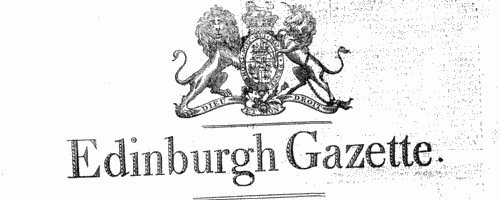
|  British merchant seamen
(1835-1836) British merchant seamen
(1835-1836)
At this period, the foreign trade of ships plying to and from the British isles involved about 150,000 men on 15,000 ships; and the coasting trade about a quarter as many more. A large proportion of the seamen on these ships were British subjects, and so liable to be pressed for service in the Royal Navy; but there was no general register by which to identify them, so in 1835 parliament passed a Merchant Seamen's Registration Bill. Under this act this large register of British seamen was compiled, based on ships' crew lists gathered in British and Irish ports, and passed up to the registry in London. Each seaman was assigned a number, and the names were arranged in the register by first two letters of the surname (our sample scan shows one of the pages for 'Sm'); in addition, an attempt was made to separate out namesakes by giving the first instance of a name (a), the second (b), and so on. But no effective method was devised to prevent the same man being registered twice as he appeared in a second crew list; moreover, the original crew lists were clearly difficult for the registry clerks to copy, and some of the surname spellings appear to be corrupted. A parliamentary committee decided that the system devised did not answer the original problem, and this register was abandoned after less than two years: but it is an apparently comprehensive source for British merchant seamen in 1835 to 1836. The register records the number assigned to each man; his name; age; birthplace; quality (master, captain, mate, 2nd mate, mariner, seaman, fisherman, cook, carpenter, boy &c.); and the name and home port of his ship, with the date of the crew list (usually at the end of a voyage). Most of the men recorded were born in the British Isles, but not all (for instance, Charleston and Stockholm appear in the sample scan). The final column 'How disposed of' is rarely used, and indicates those instances where a man died, was discharged, or deserted his ship during the voyage.BLACKADDER. Cost: £8.00.  | Sample scan, click to enlarge
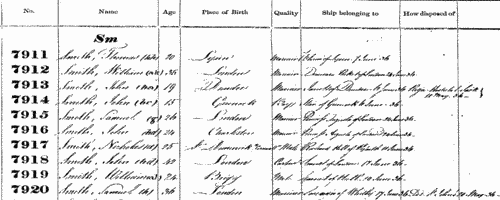
|  British merchant seamen
(1835-1840) British merchant seamen
(1835-1840)
At this period, the foreign trade of ships plying to and from the British isles involved about 150,000 men on 15,000 ships; and the coasting trade about a quarter as many more. A large proportion of the seamen on these ships were British subjects, and so liable to be pressed for service in the Royal Navy; but there was no general register by which to identify them, so in 1835 parliament passed a Merchant Seamen's Registration Bill. Under this act a large register of British seamen was compiled, based on ships' crew lists gathered in British and Irish ports, and passed up to the registry in London. A parliamentary committee decided that the system devised did not answer the original problem, and the original register was abandoned after less than two years: the system was then restarted in this form, with a systematic attempt to attribute the seamen's (ticket) numbers, and to record successive voyages. The register records the number assigned to each man; his name; age; birthplace; quality (S = seaman, &c.); and the name and official number of his ship, with the date of the crew list (usually at the end of a voyage). Most of the men recorded were born in the British Isles, but not all. The system was still very cumbersome, because the names were amassed merely under the first two letters of surname; an attempt was made to separate out namesakes by giving the first instance of a name (a), the second (b), and so on. During 1840 this series of ledgers was abandoned, and a new set started with names grouped together by surname. BT 112/6BLACKADDER. Cost: £8.00.  | Sample scan, click to enlarge

| Railway Subscription Contracts
(1845)
£21,386,703 6s 4d was promised by about 10,000 subscribers of less than £2,000 per contract to the nearly 200 railway bills deposited in the Private Bill Office during the Session of Parliament for 1845. This alphabetical list gives the full names of the subscribers (surname first), description (i. e., occupation), place of abode, a numerical reference to the title of the railway, the amount subscribed to each, and total. There is a separate key to the titles of the railways.BLACKADDER. Cost: £4.00.  | Sample scan, click to enlarge

| The Edinburgh Gazette
(1846)
The Edinburgh Gazette is the official publication in which various Scottish legal notices are issued, as well as promotions and casualty lists for the British army as a whole, and brief lists of English bankrupts. The key source for tracing details of Scottish bankruptcies, insolvencies, and dissolutions of business partnerships.BLACKADDER. Cost: £6.00.  | Sample scan, click to enlarge
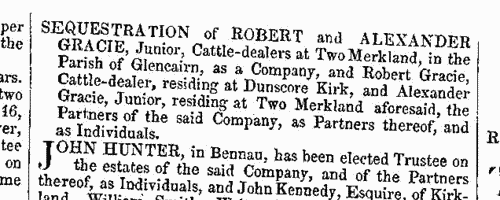
| Missionary donations from Scotland
(1855)
The Congregational and a number of other independent churches together formed the Evangelical Alliance, committed to promoting and supporting missions to the heathen. The areas chosen for their projects were Guiana, South Africa, India, the South Seas and China. The work of the missionaries was not only in preaching the Gospel, but also in translating the Bible into local languages, and establishing churches, schools and orphanages. Orphans and native teachers were often given the names of principal contributors or congregations back in Britain. In Britain the large amounts of money needed for this work were raised among the Congregational and independent congregations, arranged by auxiliaries for each county (although some contributions for each county might in fact come in from congregations and individuals in neighbouring areas); money was gathered by ministers, at special services, by supporters, and in missionary boxes. The accounts of all these contributions were published as part of a monthly magazine called the Evangelical Magazine. Each issue of the magazine carried obituaries of prominent members of the congregations; general articles on religion; reviews of newly-published religious books; home news, mainly about meetings of importance or interest by the alliance or in individual churches; and then a separate section called the Missionary Chronicle. The Missionary Chronicle was devoted to letters and reports from the missionaries; and concludes with a set of accounts of donations towards the missionary work. This is the index to the donations reported in the magazine, January to December 1855, from Scotland.BLACKADDER. Cost: £6.00.  | Sample scan, click to enlarge
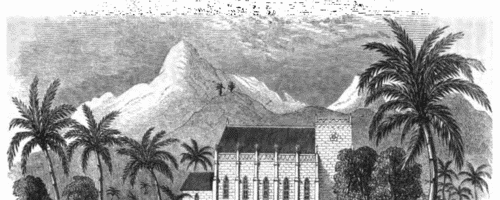
| Contributors to the Phonetic Fund
(1856)
The Phonetic Journal, published weekly, contains English texts rendered phonetically, and news about the promotion of phonetic reform and phonography. The section entitled Intelligence included lists of new members of the Phonetic Society, alterations (such as changes of address), and lists of contributions to the Phonetic Fund. The lists of new members give full name (surname first) and address, preceded by a number indicating the class or grade achieved in their phonetic studies. In the tables of contributions, full names and addresses are only given for the major donors; the mass of small contributors are listed by surname and initials.BLACKADDER. Cost: £6.00.  | Sample scan, click to enlarge

| Missionaries and contributors
(1864)
The Evangelical Magazine and Missionary Chronicle records the work of Christian missionaries throughout the world, and of the supporting missionary societies collecting money for the work in the British Isles. Contributions are listed by congregation, and by family members making donations.BLACKADDER. Cost: £8.00.  | Sample scan, click to enlarge
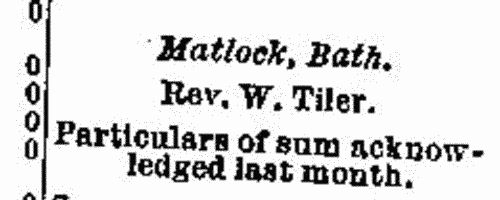
| Debtors
(1886)
County Court Judgments in England and Wales. July to September 1886BLACKADDER. Cost: £6.00.  | Sample scan, click to enlarge

| Scottish Debtors, Insolvents and Bankrupts
(1886)
Protests on Bills of Exchange, Sequestrations and Cessio Bonorums in Scotland, April to June 1886BLACKADDER. Cost: £6.00.  | Sample scan, click to enlarge

|
Research your ancestry, family history, genealogy and one-name study by direct access to original records and archives indexed by surname.
|













